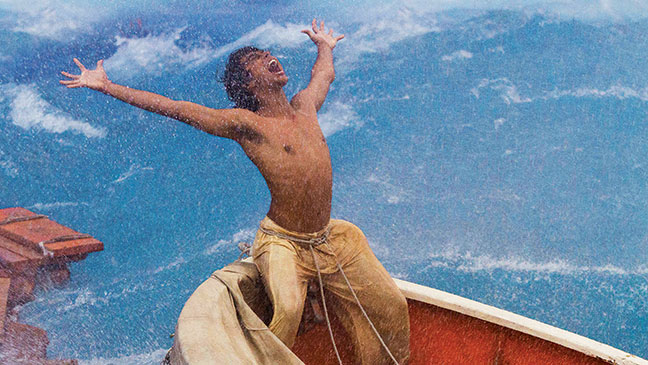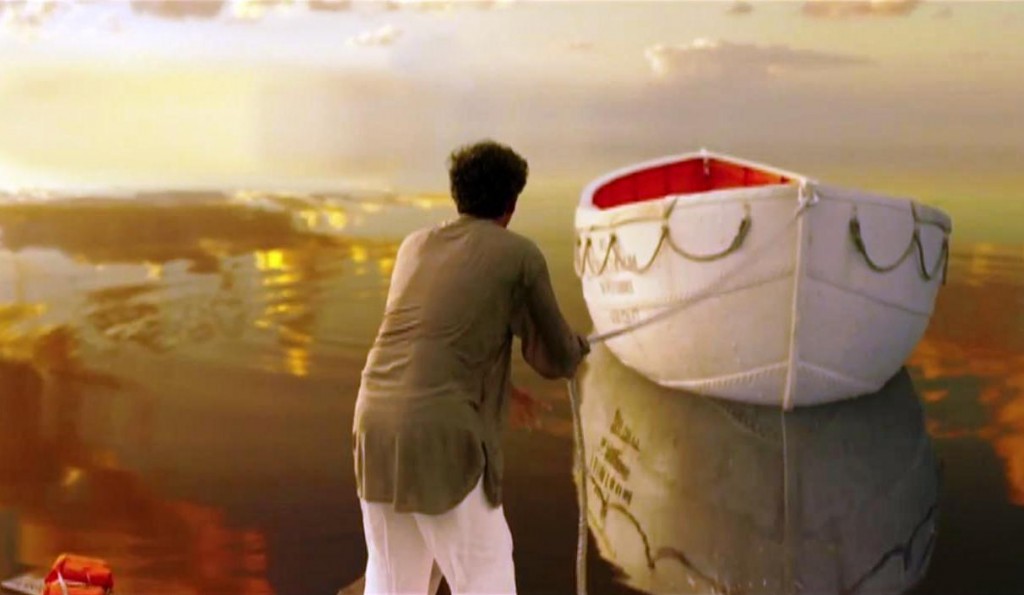Tigers, Elephants, & A Slice of PI
by guest reviewer Andrew Thompson
![life-of-pi-banner-image-4[1]](http://cinemagogue.com/wp-content/uploads/2013/12/life-of-pi-banner-image-41-1024x460.jpg) The Life of Pi is a stunning tale that takes us into the story of a young man adrift at sea with a Bengal tiger. It’s not only a tale of survival, but a deeply spiritual story of the narrator’s faith through troubled waters. It’s easy to dismiss this film spiritually (as many have) but I think it reveals great depths about uppercase God, and mankind’s desire to worship.
The Life of Pi is a stunning tale that takes us into the story of a young man adrift at sea with a Bengal tiger. It’s not only a tale of survival, but a deeply spiritual story of the narrator’s faith through troubled waters. It’s easy to dismiss this film spiritually (as many have) but I think it reveals great depths about uppercase God, and mankind’s desire to worship.
Have you ever asked why stories are so powerful? They are inescapable. We make sense of our lives, past, present and future through story. However, as we see with Pi’s story we are left with options. An allegory of truth that is fantastic, vivid, and wild, filled with glowing seas, flying fish, carnivorous islands and a tiger. Or is it? Maybe he is telling a complete fabrication of his imagination to make sense of the horror of being shipwrecked at sea. The first story is elaborate and more about deeper spiritual meanings: the facts don’t matter as much. The second story is told quickly and without much detail only the facts of a much more dire journey. So we are left with these options to ponder:
1. Pi is telling the literal truth about what happened… but then tells the Japanese a conscious lie as an act of mercy when he sees that they can not bear the weight of the miraculous tiger tale. (Or maybe his second tale is as an act of self-deliverance: that is, to give them what they want to hear, to get them out of his hospital room so he could get some rest).
2. Pi has unconsciously created the tiger myth to hide the unbearable truth of what happened on the lifeboat from himself… but then tells the true horror story to the Japanese as a disburdening confession. He then recedes unconsciously into believing the myth because it helps him live with and relate to the mystery of evil (including the knowledge of what human beings, including himself, are capable of).
3. Pi knows perfectly well that the tiger tale is a myth, and what the myth symbolizes about himself, nature, and humankind… but he chooses to live by the myth because he recognizes that although the facts may be confected, they tell deeper truths about life, the universe, and God, in a way that finite human beings can relate to.
4. Pi is honestly not sure where truth ends and fiction begins. The tiger tale might have happened exactly as he remembered it. The tale of murder he gave the skeptical Japanese might instead be the truth. He can’t be sure, and there is no way to ever know for certain. But he chooses to embrace the life-giving, hope-inspiring version of what happened on the sea, because it benefits him, including helping him to be a loving husband and father.
What’s interesting about this movie however, is that any of these four alternatives could have been posed by Pi’s rationalist father. Pi explicitly rejects this way of thinking or explanation when he considers himself a Hindu and a Christian and a Muslim. The movie seems to be suggesting that both contradictory tales are true, in the same way he believes that the religions he follows are all true.
In fact, the movie is intentionally being ambiguous, because the screenwriters wrote it in such a way that would be appealing to all:
“We were hoping it would speak to people of faith. But this is also a film about storytelling. It’s about the way we deal with the chaos in our lives. And the meaning behind the journey. It can be seen as having different lessons for different people.” – David Magee, screenwriter
The fact of the matter is what happened to Pi does matter: the facts, even though we aren’t privy to them, are important Through his story, we are exposed to truths he is learning about God both through the plot and as an observer.
What do you think? Can we relate to his situation? Do we find ourselves in life feeling adrift at sea with a beast that wants to destroy us? Do we ever feel like God has abandoned us? Or maybe has it out for us? We see Pi wrestling with this questions throughout the film. In one of his darkest moments Pi is crying out to God in weakness and desperation:
“Why are you scaring him? I lost my family! I lost everything! I surrender! What more do you want?”
And yet, almost in the very next scene, he is proclaiming real truths about God:
“No one has seen that island since, and you’d never read about those trees in any book. And yet, if I hadn’t found those shores I would have died, if I hadn’t discovered that tooth I would have been lost alone forever. Even when God seemed to have abandoned me, he was watching. Even when He seemed indifferent to my suffering, He was watching and when I was beyond all hope of saving… He gave me rest and gave me a sign to continue my journey…
These quotes made me think of two verses from Isaiah that paralleled this narrative. In chapter 40 we see Isaiah describing Pi’s kind of weariness and exhaustion.
Even youths shall faint and be weary, and young men shall fall exhausted; but they who wait for the Lord shall renew their strength; they shall mount up with wings like eagles; they shall run and not be weary; they shall walk and not faint. – Isaiah 40:30-31
And in the very next chapter of Isaiah, we have a promise from God that he will never leave us.
“You are my servant, I have chosen you and not cast you off”; fear not, for I am WITH you; be not dismayed, for I am your God; I will strengthen you, I will help you, I will uphold you with my righteous right hand. – Isaiah 41:9b-10
Like Pi, God is in the very midst of our stories sustaining us every step of the way.
A question, of course, is should we make a distinction here about what God we are talking about? Or even can we make a distinction? This movie was made for the culture that surrounds us, and it’s very popular today to pick and chose spiritualities as we please, combining them in a religion that looks and feels more like a trip to the salad bar – bit of this, dash of that, sprinkle of that. “Coexist” is the label people brandish their cars with and the quote “faith is a house with many rooms” from the movie almost exuded “Amens” in the theater where I saw it.
How much do we know about what other religions believe? When it comes to religious faith, there’s too much at stake to simply punt on the question of why major world religions differ from one another. Unfortunately, Life of Pi doesn’t bother to make distinctions between the faiths at the heart of its story, and despite its cinematic beauty, its one weakness is suggesting that truth boils down to mere subjective preference.
With the importance of animals in the film, and all this talk about subjective truth, it reminds me of a very common story about a king who brings in six blind men who are each given a part of an elephant to touch and report what they think know about an elephant from what part they are touching. One man falls against the side of the elephant and proclaims the elephant is a wall. Another leans on the tusk and proclaims an elephant is a spear. Another touches the trunk and proclaims the elephant is a snake. Another touches the knee and proclaims the elephant is a tree. Another touches the ear and proclaims the elephant is a fan. And the last one grabs the tail and proclaims the elephant is a rope.
Many believe the point of the story is that, while each blind man is proclaiming what they believe to be is an absolute truth, the fact is that all of their truths are relative based on their experience of the elephant. No one has the “capital T” truth in its entirety. This story is often used to critique those who proclaim any knowledge of absolute truth (most commonly those with a monotheistic religious world view). It’s intended to teach us how knowledge and truth is in fact relative… or IS it?
The famous Christian theologian/missionary Lesslie Newbigin responds to this story with:
“In the famous story of the blind men and the elephant… the real point of the story is constantly overlooked. The story is told from the point of view of the king and his courtiers, who are not blind but can see that the blind men are unable to grasp the full reality of the elephant and are only able to get hold of part of it. The story is constantly told in order to neutralize the affirmations of the great religions, to suggest that they learn humility and recognize that none of them can have more than one aspect of the truth. But, of course, the real point of the story is exactly the opposite. If the king were also blind, there would be no story. What this means then is that there is an appearance of humility and a protestation that the truth is much greater than anyone of us can grasp. But if this is used to invalidate all claims to discern the truth, it is in fact an arrogant claim with the kind of knowledge which is superior that you have just said, no religion has.”
Popular culture likes the seemingly humble idea that no one can make a universal claim to truth. Culture has embraced the idea that there are many paths. In making such a statement, however, they are making a rather arrogant universal claim to truth.
Is it arrogant to make a universal truth claim that Christians have the answer? Not if, for the Christian, it’s humbly submitting and saying “I’m broken and don’t have the answers, and I’m feeling called to follow and have faith in a God who has taken the time to tell me about how he sent his Son incarnate to earth”. Christians believe that God is the King in the elephant story, a good king, and instead of making us feel around to figure out what the truth of the elephant is, he sent someone tangible and physical to explain the elephant to us. Christians that man, Jesus, is THE way, THE truth, and THE light not because we said so, but because He did.
No one really disputes Jesus’ historicity… so 2,000 years ago something happened and you basically find yourself – not unlike Pi and his listeners – with two stories about Jesus. Either this compelling teacher showed up with some good social justice ideas but also false promises of eternal life and delusions of godhood that got him crucified, and by the roll of the dice a relatively insignificant Jewish guy has had a cascading impact on culture for a few thousand years… OR the God of the universe manifest himself as a humble human, served and loved people, brought example and truth, lived a perfect life, flipped the script on the religious system… and then got beaten, crucified and killed to atone for the sin of others (you, me) and rose from the dead three days later to demonstrate eternal life is possible with our loving Creator, the Master storyteller.
Which story do you prefer?
(Andrew Thompson is good friends with James Harleman, editor-in-chief and hosted Life of Pi as a Film & Theology event.)

![life-of-pi-tiger[1]](http://cinemagogue.com/wp-content/uploads/2013/12/life-of-pi-tiger1-1024x576.jpg)


![maxresdefault[1]](http://cinemagogue.com/wp-content/uploads/2013/12/maxresdefault1-1024x576.jpg)
![life-of-pi[1]](http://cinemagogue.com/wp-content/uploads/2013/12/life-of-pi1-1024x563.jpg)
![elephant-mural[1]](http://cinemagogue.com/wp-content/uploads/2013/12/elephant-mural1-1024x550.jpg)



